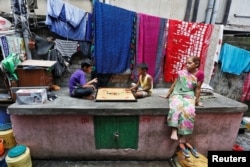Investing in rural areas is crucial to slowing the migration of millions of desperate people from farms to city slums, helping to end poverty and boosting the economies of developing countries, a U.N. agency said Wednesday.
Three quarters of the world's poorest and hungriest people live in rural areas, yet these are often ignored by governments and development experts, the U.N. International Fund for Agricultural Development (IFAD) said.
Small farmers produce 80 percent of the food eaten in Asia and sub-Saharan Africa, and 2.5 billion people worldwide depend directly on small farms for their incomes, the agency said.
"The development community needs to ... redouble efforts to help them to achieve dignified and prosperous livelihoods ... free from hunger and filled with hope," IFAD president Kanayo Nwanze said at the launch of the 2016 Rural Development Report.
Many governments and experts think of development in terms of urbanization and the growth of industries and services, said IFAD's Paul Winters, who heads the team that wrote the report.
More than 50 percent of the world's population now lives in cities, a rise from 33 percent in 1960, according to the World Bank.
"My big concern is countries are basically going to ignore the rural sector — and the fact that a huge number of the unemployed and the poor are in rural areas," said Winters, head of IFAD's research and impact assessment division.
"They're basically going to export poor people from rural areas to urban slums — and that's a failure of policy," he told the Thomson Reuters Foundation in an interview.
IFAD's report studied 60 countries and found that economic growth alone was not enough to tackle rural poverty. Policies and investment by governments and businesses were also necessary.
Countries which had developed their rural areas the most included China, Vietnam, Indonesia, Ecuador, Cameroon, Malawi, Mozambique and Ethiopia.
Last year, world leaders committed to an ambitious plan to end poverty and hunger by 2030.
But these goals will not be met unless governments and the private sector invest more in technology, communications and better roads in rural areas while helping small farmers meet the demands of growing urban populations and large food businesses, development experts said.
"Rural transformation is not automatic. It is a choice," said Nwanze, who was awarded last week the first Africa Food Prize, which recognizes those leading efforts to transform farming in Africa.






